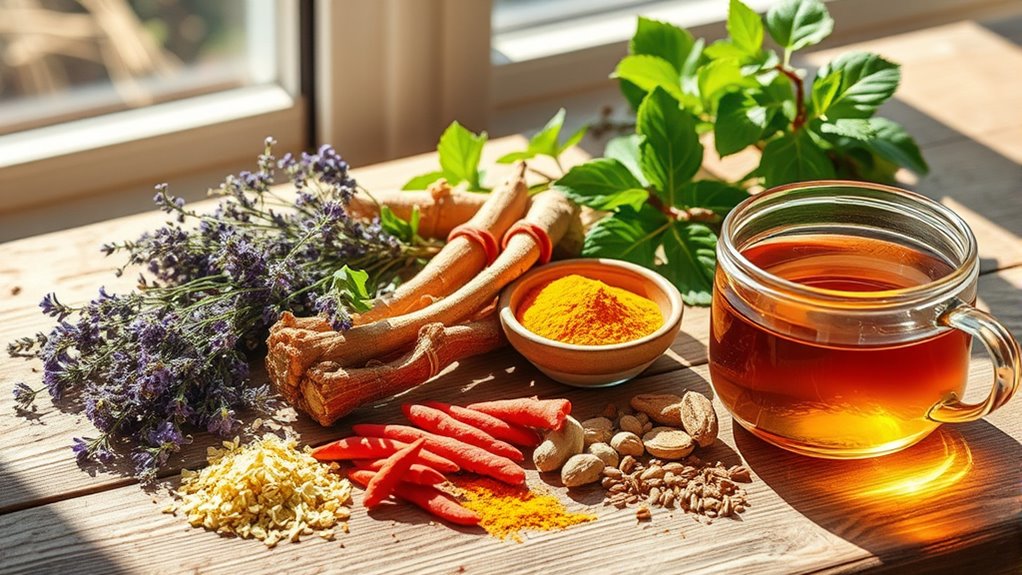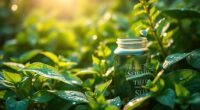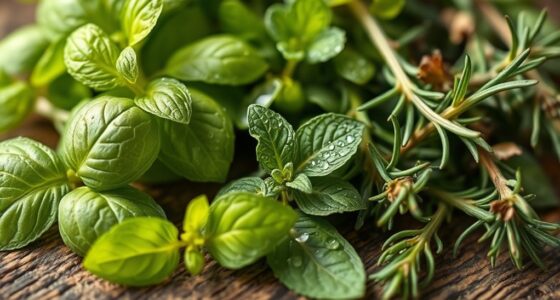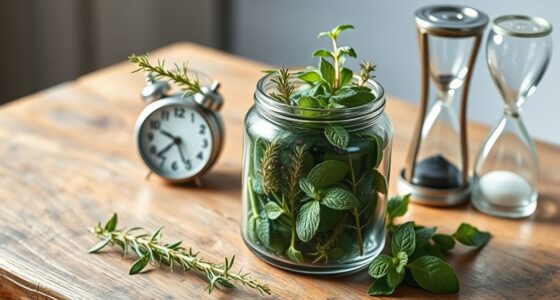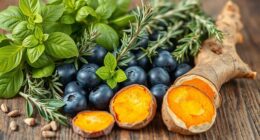Herbal remedies can help you balance hormones naturally and reclaim your youthful vitality during menopause. Herbs like black cohosh, red clover, and dong quai are known to reduce hot flashes, night sweats, and mood swings while promoting relaxation and better sleep. Incorporating herbal teas or supplements into your daily routine offers gentle, effective relief. If you want to discover more about how specific herbs can support your well-being, keep exploring how these natural solutions can work for you.
Key Takeaways
- Incorporate herbal teas with black cohosh, red clover, and dong quai to support hormonal balance and restore youthful vitality.
- Use herbal blends containing sage and chasteberry to reduce hot flashes, night sweats, and improve mood.
- Maintain daily consumption of high-quality, organic herbs to enhance overall well-being and energy levels.
- Combine herbal remedies with a holistic lifestyle for better sleep, reduced anxiety, and increased vitality.
- Consult healthcare professionals before starting herbal supplements to ensure safety and effective integration into your routine.

Menopause can bring a range of challenging symptoms, but many women turn to herbal remedies for relief. If you’re seeking natural ways to restore your energy and comfort, focusing on hormonal balance is key. Herbal teas are a popular choice, as they can gently support your body’s natural processes and help regulate your hormones. When you sip on these teas regularly, you may notice a reduction in hot flashes, night sweats, and mood swings. The soothing warmth of herbal teas not only comforts your body but also provides a calming ritual that can ease anxiety and promote better sleep.
Herbal teas support hormonal balance, easing menopause symptoms and promoting relaxation.
Certain herbs are especially effective in promoting hormonal balance. For example, black cohosh has been used for generations to alleviate menopausal symptoms by acting on estrogen receptors. Red clover contains isoflavones, plant compounds that mimic estrogen and help ease hot flashes. Dong quai, often called “female ginseng,” is another herb that supports hormone regulation and enhances overall vigor. Incorporating these herbs into your daily routine through teas or tinctures can help you regain a sense of normalcy and youthfulness.
You might also explore teas made from sage, which is known for reducing excessive sweating and hot flashes. Chasteberry, or vitex, can stabilize hormone levels and improve mood swings. Combining these herbs in your tea blends allows you to tailor your approach based on your specific symptoms. Remember to choose high-quality, organic herbs to maximize their effectiveness and minimize exposure to pesticides or additives. Consistency is important; drinking herbal teas daily can gradually restore your hormonal balance and lessen menopausal discomfort.
In addition to herbal teas, other herbal supplements and tinctures can complement this approach. For example, some studies suggest that herbal remedies used in other regions have shown promising results in managing menopausal symptoms. However, always consult with a healthcare professional before starting new herbal regimens, especially if you’re on medication or have underlying health conditions. They can guide you on safe dosages and help you avoid potential interactions. By embracing herbal remedies that focus on hormonal balance, you’re actively supporting your body’s natural ability to adapt to menopause. This holistic approach can make you feel more youthful, energized, and in control of your well-being. Through patience and persistence, these herbal remedies can help you navigate menopause with greater ease, bringing comfort and vitality back into your life.
Frequently Asked Questions
Are Herbal Remedies Safe for Long-Term Use During Menopause?
You might wonder if herbal remedies are safe for long-term use during menopause. While many are natural, safety considerations matter—consult your healthcare provider to avoid potential interactions. Guarantee proper herbal sourcing to avoid contaminants or adulterants. Using high-quality, reputable products can help you safely incorporate herbal remedies into your menopause journey, but always prioritize professional guidance to minimize risks and achieve the best results.
Can Herbal Remedies Completely Replace Hormone Therapy?
Herbal remedies can be a helpful part of alternative treatments, but they can’t completely replace hormone therapy. While herbal efficacy varies and some women find relief with herbs, they might not address all symptoms or underlying causes. You should discuss your options with a healthcare provider to determine the best approach for your menopause symptoms, as combining treatments might offer more all-encompassing relief without the risks of hormone therapy.
Which Herbs Are Most Effective for Mood Swings During Menopause?
You want to know which herbs help with mood swings during menopause. Some effective options include St. John’s Wort, known for easing mild depression, and Black Cohosh, which can balance mood swings. Always consider herbal supplement safety and consult with a healthcare provider before trying alternative therapies. These herbs may offer relief, but they work best combined with a healthy lifestyle and professional guidance.
Are There Any Side Effects From Herbal Menopause Treatments?
You might wonder if herbal menopause treatments have side effects. While many herbs are safe, herbal interactions can occur, especially if you’re on other medications. It’s crucial to take into account dosage considerations, as too much can cause issues like digestive upset or hormonal imbalances. Always consult your healthcare provider before starting herbal remedies to ensure they’re suitable for you, and to avoid potential adverse effects.
How Do I Determine the Right Herbal Remedy for My Symptoms?
Choosing the right herbal remedy is like finding a needle in a haystack, but start with a thorough symptom assessment. Consider your specific symptoms and research herbal selection options that target them. It’s best to consult with a healthcare provider who can guide you based on your health history, ensuring you pick a safe, effective remedy tailored to your needs. Trust your body’s signals as your compass on this journey.
Conclusion
So, who knew that turning to herbal remedies could make you feel youthful again? Just when you think menopause is the end of your vibrant days, a simple herb might be your secret weapon. Ironically, what’s old-fashioned or natural often surprises us with its power. So go ahead, embrace those age-old remedies—you might just find the fountain of youth tucked inside a humble herb. Who knew feeling young again was just a leaf away?

